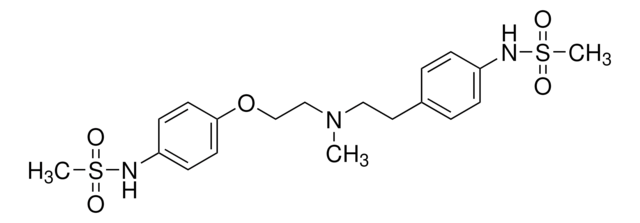SML0353
Azimilide dihydrochloride
≥97% (HPLC)
Synonyma:
1-[[[5-(4-Chlorophenyl)-2-furanyl]methylene]amino]-3-[4-(4-methyl-1-piperazinyl)butyl]-2,4-imidazolidinedione dihydrochloride
About This Item
Doporučené produkty
assay
≥97% (HPLC)
form
powder
storage condition
desiccated
color
white to beige
solubility
DMSO: 1 mg/mL, clear (warmed)
storage temp.
2-8°C
SMILES string
Cl.Cl.CN1CCN(CCCCN2C(=O)CN(\N=C/c3ccc(o3)-c4cccc(Cl)c4)C2=O)CC1
InChI
1S/C23H28ClN5O3.2ClH/c1-26-11-13-27(14-12-26)9-2-3-10-28-22(30)17-29(23(28)31)25-16-20-7-8-21(32-20)18-5-4-6-19(24)15-18;;/h4-8,15-16H,2-3,9-14,17H2,1H3;2*1H/b25-16-;;
InChI key
SUHOTCCGXXEWJN-DSHYBBOZSA-N
Application
Biochem/physiol Actions
Features and Benefits
signalword
Danger
hcodes
Hazard Classifications
Acute Tox. 3 Oral
Storage Class
6.1C - Combustible acute toxic Cat.3 / toxic compounds or compounds which causing chronic effects
wgk_germany
WGK 3
flash_point_f
Not applicable
flash_point_c
Not applicable
Osvědčení o analýze (COA)
Vyhledejte osvědčení Osvědčení o analýze (COA) zadáním čísla šarže/dávky těchto produktů. Čísla šarže a dávky lze nalézt na štítku produktu za slovy „Lot“ nebo „Batch“.
Již tento produkt vlastníte?
Dokumenty související s produkty, které jste v minulosti zakoupili, byly za účelem usnadnění shromážděny ve vaší Knihovně dokumentů.
Sortimentní položky
We offer many products related to potassium channels for your research needs.
Náš tým vědeckých pracovníků má zkušenosti ve všech oblastech výzkumu, včetně přírodních věd, materiálových věd, chemické syntézy, chromatografie, analytiky a mnoha dalších..
Obraťte se na technický servis.









